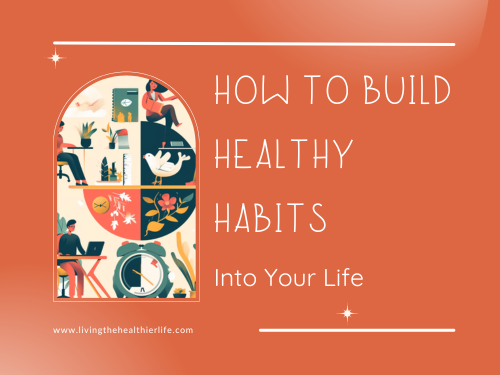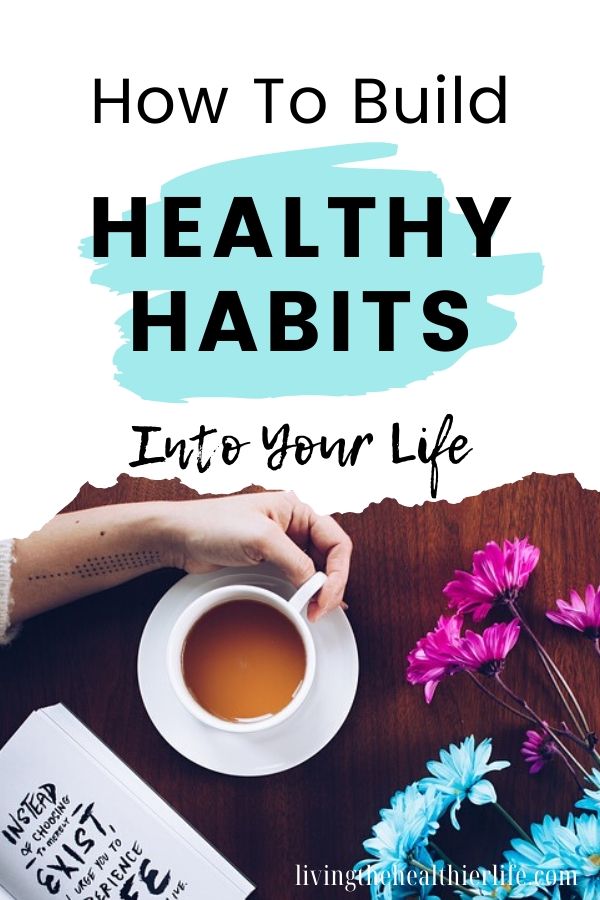We all have a strong desire to live a healthier lifestyle and abide by healthy habits. But how often do good intentions fizzle out into broken promises and failed resolutions?

I was interested in this question not long after New Year’s Day when I suggested to my daughter that both of us start doing yoga. This will be an easy goal for her. She loves gymnastics and is constantly upside down on the end of the sofa or trying to practise cartwheels. I, on the other hand, have a dozen or so failed attempts over the years to start yoga, including some expensive and unused yoga DVDs I purchased on a whim, including antenatal yoga guides that promised to make childbirth a breeze (I’m sure you can guess how that ended).
What’s to stop my latest improvement drive becoming another failure? Well, I thought I’d do some research into how to create a new healthy habit in your life – and actually get it to stick. What I found was fascinating and eye-opening, so I decided to share it with you here.
First, a bit about the brain.
Rewiring Your Brain To Build Healthy Habits

I came across some fascinating information about how the brain works when it comes to habit-forming and habit breaking. It turns out that our brain is wired to create habits. But it won’t distinguish between a habit that’s good for you and one that’s not.
When you keep repeating an activity, your brain starts working at making itself more efficient and turn these patterns into a routine (so that the activity requires less thought processing in future). Think about a familiar destination and how easy it is for you to drive there without giving any thought to how you are driving. That’s a good example of your brain acting efficiently.
You can help your brain create those habits through consistency. And so it may seem that consistency is the key to building good habits into your life.
It’s important therefore in the early days of a new habit that you don’t break it or skip a day because that’ll make it harder for your brain to recognise it as a new candidate for a habit – so in those early days when you struggle to do that new thing, don’t give up – that’s the time to keep going with it until you start doing it automatically.
Triggering A New Habit

Your brain also needs a trigger – something that will act as a cue for your new habit. If you’re trying to get into running, for example, a simple trigger can be putting your trainers on. So don’t think that you need the strength of willpower to make yourself go for a run. Simply find a tiny bit of effort to put in your trainers and your brain will do the rest for you.
Using Rewards To Encourage Healthy Habits
The other thing your brain needs to form healthy habits is a reward. This is easy with bad habits like eating sugar, as there’s an immediate chemical reward, and if you exercise hard enough you’ll release endorphins. But healthy habits might not have an obvious ‘good’ reward, so you’ll need to find something and make sure you always do that when you complete your new positive activity. For example, if you’re trying to quit drinking, find a fun activity that you can replace it with. Every time you consciously say no to a drink, make sure you have that new activity on standby to do instead (what about a dance class!).
Getting Comfortable With Imperfection
What’s that old saying? Perfection is the enemy of the good? It’s easy to go full steam ahead into creating brand new healthy habits in your life, but by aiming for such a huge sweeping change, you could actually be setting yourself up for failure.
Research has shown that we are far more likely to achieve a change if it’s small, manageable and easy to fit into our existing lives.
So if you do want a new habit to become part of your life, break it down into tiny changes, and work on those changes one at a time. For example, if you want to break bad diet habits and lose weight, instead of trying a brand new diet that will require you to master a new eating timetable, calorie counting and hundreds of recipes, start with a tiny change to your habits, like removing processed sugar from your diet.
Learn to accept imperfection in your life and get comfortable with it. The people who succeed with positive changes are the ones who don’t get hung up on making those changes perfect but figure out a way to make small improvements that they can easily fit into their lives.
Measure How Far You’ve Come, Not How Far You Have Left To Travel
Earlier in the post, I talked about the need for rewards, and one of the most important rewards for your brain is positive reinforcement – that message to yourself that you are doing great, you’ve made progress, and you should continue.
To do that, look backwards instead of forwards. Think about it in terms of climbing one thousand steps. If you feel tired after 100 steps, you’ll look at 900 steps ahead of you and feel disheartened. But if you turn around, and remind yourself that you’ve just managed to climb 100 steps, you’ll feel motivated. Try it. It really does work.
Create Boundaries
Saying no to anything often feels uncomfortable. One of the reasons we get into bad habits in the first place is that we say yes to something as a one-off and that yes becomes more commonplace as time goes on.
One of the most important actions you can take to break a bad habit is to create some boundaries in your life. That boundary will empower you to say no and feel comfortable saying no. No, you won’t see the dessert menu because you don’t eat desserts, and since you are quitting sugar, one of your boundaries is what courses you eat when you go to a restaurant. The dessert menu is your boundary, your rule, and that’s what you always stick to whenever you eat out. Do it repeatedly, and you’ll feel comfortable with the idea that things that used to be such a big part of your life no longer are. Now you have some boundaries and you do not cross them.
Get A Friend Involved
It’s often easier to break a bad habit if you have a good friend who can support you. That might mean they quit that habit alongside you, but more often it means having someone around you who can help you build new, good healthy habits in your life. A great example of this is going to the gym three times a week. If you have a gym buddy, you have added motivation to keep that habit going. By skipping the gym, you’re not only letting yourself down but your gym buddy too.
Make Self Care A Priority
We tend to fall back on bad habits (or break new good habits) when we are stressed and run down. You can help avoid this by making sure self-care is an important part of your everyday routine. I have a free planner that can help you add some self-care time into even the busiest, most stressed schedule – if you’d like a copy, click here for the planner or use the form below.
Now it’s over to you. Tell me in the comments: have you managed to free yourself from a destructive habit? Or perhaps you’ve managed to create a great new habit in your life recently? Let me know below.

